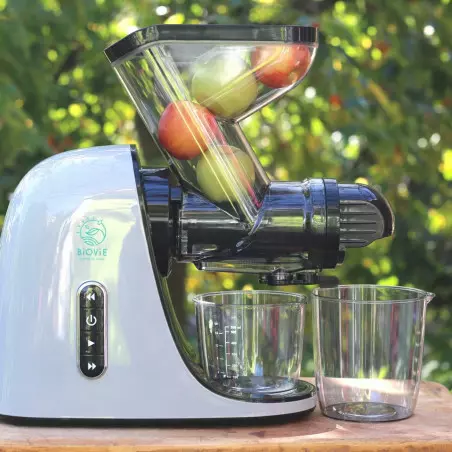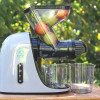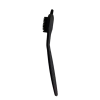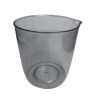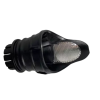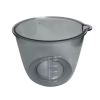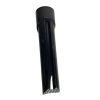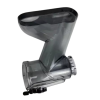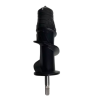When it comes to preparing fresh fruit and vegetable juices at home, there are two popular options: the centrifuge "and the"juice extractor. While both of these devices allow for the creation of delicious and nutritious juices, they differ in their extraction method and their impact on the quality of the juice produced.
So, how do you choose between a centrifugal juicer and a juice extractor? The answer is in the rest of the article.
How to distinguish a juicer from a centrifugal juicer ?
The centrifugal juicer is the most common and affordable juice machine. It is used by households and also predominantly by industrial manufacturers because it is valued for its speed. The food is finely grated, and then the centrifugal juicer uses the principle of centrifugal force to separate the juice from the fibers, crushing the food at higher temperatures due to the rotation speed, which ranges from 3,000 to 10,000 revolutions per minute for a centrifugal juicer compared to 30 to 120 revolutions per minute for a juice extractor. A centrifuge therefore spins on average 100 times faster than a low-speed extractor.
The disadvantage is that at this speed The centrifuge damages the cell walls of fruits and vegetables., The cells are therefore damaged and directly exposed to oxygen, which oxidizes the juices during production and thus reduces their nutritional value. The juice loses its precious enzymes, and many nutrients are destroyed. These oxidized juices do not keep well and must be consumed quickly (hence the industrial use of antioxidant substances for commercial juices).
On the other hand, it should be noted that the centrifuge does not allow for the extraction of grass juices.
The screw juicer has a slow movement, the extraction is gentle, cold, and without heat production .
One juice extractor allows for the preservation of a maximum amount of nutrients, vitamins, and enzymes and to produce a juice that is nutritionally higher than a juice made with a centrifugal juicer. This juice remains stable and can be stored in the fridge, ideally vacuum-sealed, for 24 hours. The best option is to consume it immediately after production.
The juicer is a very fast and easy-to-clean device compared to the centrifugal juicer.
It looks like your text got cut off. Could you please provide the complete text you would like translated from French to English?juice extractor remains more expensive than a centrifugal juicer, but the investment is offset by its better efficiency and optimal nutritional benefits.
A simple test involves making juice with an extractor and the same juice with a centrifuge. By letting the juices settle, you will quickly notice a separation in the juice made with the centrifuge.
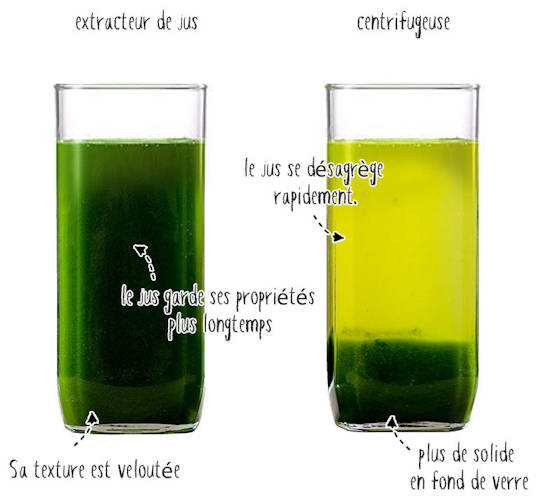
Which is better, a juicer or a centrifugal juicer ?
The choice between a juicer and a centrifugal juicer depends on your personal preferences and specific needs. Each of these devices has its advantages and disadvantages, and the best option for you will depend on your priorities regarding fresh juice.
Consuming vegetable juices and mixed fruit and vegetable juices is part of a healthy daily diet. The juicer operates on the principle of a slow-speed auger rotation that mimics chewing and gently crushes the food, similar to how teeth would, to extract the juice cold. The fibers are expelled from one side, and the extracted juice from the other. The cell walls remain intact, the nutrients are preserved, which is also reflected in the taste.. The auger juicer is more expensive to purchase but definitely produces a higher quality juice.
On the other hand, the centrifugal juicer is appreciated for its speed and ease of use. It is perfectly suited for those looking for a practical solution to quickly prepare a glass of fresh juice. The centrifugal juicer is equipped with a rotating blade that quickly grinds fruits and vegetables, separating the juice from the pulp through centrifugal force. However, due to the high speed and heat generated by the process, some nutrients may be altered. Additionally, the juices obtained with a centrifugal juicer can be foamier and less thick than those obtained with a juice extractor.
In summary, if you place great importance on preserving nutrients and the quality of the juice, a juicer might be the ideal choice. If you prioritize speed and simplicity, a centrifugal juicer could be more suitable for you. It is also important to consider other factors such as budget, ease of cleaning, and available storage space before making your final decision.
What are the advantages of a juicer ?
Centrifuges offer several advantages that make them an attractive option for those looking to quickly prepare fresh juices. Here are some of the main benefits of a centrifuge:
Speed: Centrifuges are designed to extract juice quickly. Thanks to their high-speed rotating blade, fruits and vegetables are rapidly crushed, and the juice is extracted in just a few moments. This makes them a convenient option for busy or hurried individuals who want to get their juice quickly.
Ease of use: Centrifuges are generally easy to use. Simply cut the fruits and vegetables into pieces, place them in the chute, and turn on the device. The process is simple and user-friendly, requiring not much effort or special culinary skills.
Large feed chute: Centrifuges are often equipped with a large feed chute, which allows relatively large pieces of fruits and vegetables to be introduced. This means less time spent cutting and preparing the ingredients, which is an advantage for those who want to save time.
Ease of cleaning: Some juicers come with removable and easy-to-clean parts, which greatly simplifies the cleaning process after use. Most parts can be washed by hand or placed in the dishwasher, allowing the device to be kept clean and ready for use again.
Affordable price: Compared to juicers, centrifugal juicers tend to be less expensive. Therefore, they are a more economical option for those on a limited budget who still want to enjoy the benefits of fresh juice at home.
What are the disadvantages of a juicer ?
Although centrifuges offer undeniable advantages, they also have some drawbacks to consider. Here are a few:
Loss of nutrients: Due to the high speed and heat generated during juice extraction, some heat-sensitive vitamins, enzymes, and nutrients may be degraded. This means that the juice obtained with a centrifugal juicer may contain a slightly lower amount of certain nutrients.
Foam formation and oxidation: Centrifuges tend to produce a frothier juice due to the air incorporated during the extraction process. Additionally, because of the high speed, the juice is exposed to oxygen, which can lead to faster oxidation. This can affect the flavor, texture, and shelf life of the juice.
Lower juice yield: Compared to juicers, centrifugal juicers often have a lower juice yield. This means that a larger amount of pulp may remain in the extracted juice, thereby reducing the total amount of juice obtained from the same quantities of fruits and vegetables.
High noise level: Centrifuges operate at high speeds, which can result in a high noise level during their use. This can be bothersome, especially if you need to prepare juice early in the morning or late at night.
Difficulties in handling certain types of ingredients: Centrifugal juicers may struggle to efficiently extract juice from certain types of ingredients, such as herbs, leafy green vegetables, or stone fruits. This can result in a loss of yield and incomplete juice extraction from these ingredients.
What are the benefits of a juicer ?
The use of a juicer offers several advantages, including:
Maximum nutrient preservation: The juicer uses a slow and gentle extraction method that minimizes heat production, thereby preserving the nutrients, vitamins, enzymes, and antioxidants present in fruits and vegetables. This allows for the production of fresh and nutritious juices.
Best juice extraction: Thanks to its two-step extraction process, the juicer can extract a higher yield of juice from fruits and vegetables, especially leafy greens and herbs.
Higher quality juice: The juices obtained with a juicer tend to have a thicker texture, a more vibrant color, and a more intense flavor, as the device extracts pure juice without incorporating air or pulp.
Versatility: Some juicers can also be used to prepare other food items such as fruit purées, sorbets, or nut butters, making them a versatile appliance in the kitchen.
What are the disadvantages of a juice extractor ?
The use of a juicer also has some potential drawbacks, such as:
Longer preparation time: Compared to the centrifugal juicer, the juice extractor can take more time to prepare the juice because it uses a slower extraction method and often requires pre-preparation of the fruits and vegetables.
More complex cleaning: Juicers tend to have more detachable parts and complex to clean compared to centrifuges. This can make cleaning the device more tedious and time-consuming.
Higher initial investment: High-quality juicers can be more expensive than centrifugal juicers, which may be a factor to consider when making a purchase.
The Juice Me Up, on the other hand, with its affordable price, competes significantly with juicers.
Clutter: Juicers tend to be bulkier and take up more counter space compared to centrifugal juicers, which can be a disadvantage if you have a small kitchen.
What is the preparation time according to the chosen model ?
The preparation time varies depending on the type of device used, whether it is a centrifugal juicer or a juice extractor. Juice extraction with a centrifugal juicer is generally quick. In a few minutes, the centrifugal juicer grinds the food and separates the juice from the pulp. The exact time depends on the power of the device and the volume of the ingredients. On the other hand, the juice extractor works differently by pressing the food to extract the juice. This process is slower and more meticulous, which can take a bit more time than the centrifugal juicer. However, the exact duration depends on the model of the juice extractor and the volume of ingredients used. In summary, the preparation of the ingredients can take a few minutes, and the juice extraction varies between a few minutes for a centrifugal juicer and a bit more time for a juice extractor due to its slower process.
Which fruits should not be put in a juicer ?
Some fruits are not suitable for juicers and are better suited for use in a blender: bananas, mangoes, apricots, and peaches are not suitable for making juice. Grapes are also not suitable because the pressed seeds produce undesirable substances.
Which fruits work well in a juicer ?
Certainly, fruits that produce juice, such as certain varieties of apples, should be prioritized. The apple varieties known as "juicing apples" include Gala, Granny Smith (green), Pink Lady, and Fuji.
To be mixed with vegetables to limit the intake of fast sugars in the body.



